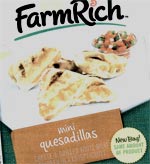 More than 80% of the patients sickened in the Farm Rich E. coli 0121 outbreak are under the age of 21. And the median age of patients is 17. Unfortunately, two of the patients have developed hemolytic uremic syndrome (HUS), the serious complication of an E. coli infection that can lead to kidney failure.
More than 80% of the patients sickened in the Farm Rich E. coli 0121 outbreak are under the age of 21. And the median age of patients is 17. Unfortunately, two of the patients have developed hemolytic uremic syndrome (HUS), the serious complication of an E. coli infection that can lead to kidney failure.
The foods linked to the outbreak are microwavable frozen snacks and mini meals; the types of foods teenagers like to eat. They are easy to make, since all you have to do is pop them in the microwave and turn it on.
But there’s more to preparing these foods than just “nuking” them. If the products are contaminated with pathogenic bacteria, as the recalled products are, how they are handled and prepared is critical. Since manufacturers do not always produce food that is safe to eat, consumers must protect themselves by always adding two steps to food preparation: thoroughly washing hands after handling the food, and checking the food’s temperature with a food thermometer before eating.
Not many people think about washing their hands after handing a frozen mini quesadilla. But in this case, that may be how 27 people got sick. A study published at Kansas State University in 2009 found that teens are less likely to wash their hands when preparing frozen foods. In the study, 20 adolescents were videotaped in a mock domestic kitchen using frozen, uncooked, commercially available breaded chicken products.
The study found that “even when provided with instructions, food preparers don’t follow them. While labels correct risk-reduction steps, food manufacturers have to make that information as compelling as possible or it will be ignored,” according to Benjamin Chapman, an assistant professor at North Carolina State University. The videos also showed that while all of the primary meal preparers reported washing their hands every time they touched raw poultry, only half were observed washing hands correctly after handling the chicken.
Of course, if the products weren’t contaminated in the first place, we wouldn’t need to warn you about this problem. But the bottom line is that you have to protect yourself in this world of convenience foods and foodborne illness risks. Always wash your hands after handling any food that is heated before consuming. Use a food thermometer to check the final temperature of any heated foods. And pay attention to recalls and warnings issued by public health officials.




